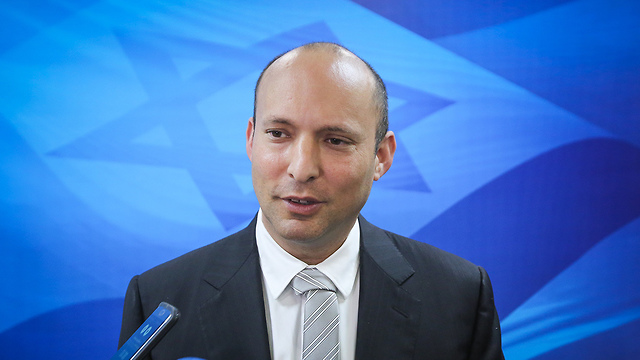
Kahlon pressured to support override power over High Court
Following meeting of coalition heads, Finance Minister Kahlon says will support 'any solution addressing migrant problem' but clarifies broader override power off the table; Education Minister Bennett: 'Time for judges to preside, government to rule again'; AG Mandelblit opposes override clause unless a 70 MK majority is required to circumvent court.
If added to the Prevention of Infiltration Law, the override power would allow the coalition to resolve the African migrants crisis, after the High Court struck down legislation that would've allowed their forced deportation. With such authority, the coalition would need a mere 61 MK majority to override the High Court's ruling.
Amid onslaught of criticism from the Likud Party, Kahlon declared he would support "any solution that provides an answer to the infiltrations problem" but stressed that "other whims are out of the question."

And ahead of a government meeting on the topic, Kahlon reportedly asserted that "I will cut off my hand if the Likud party gets more than 25 seats in the elections. If they want elections, they'll get it."
During the meeting, the ministers were presented with several options to resolve the crisis, including one plan formulated by the attorney general, and a second discussion is scheduled before a decision can be made.
Kahlon asked to have any decision on the matter made unanimously, with the approval of all coalition party heads, but Netanyahu rejected the request.
"Such a discussion was held over a decade ago without results," Netanyahu said. "We are motivated tor reach balanced and correct solutions to deal with the challenges of the present and future responsibly."
Education Minister and Bayit Yehudi chief Naftali Bennett said that, "In light of the continuing erosion of the executive branch's authority over the past few years, it's time for justices to go back to presiding and the government to again rule.
"On matters such as infiltrators and destroying terrorists' homes, our hands are being bound. We have to go from words to actions. I'll support any legislation regarding the override power."
The finance minister then interjected to tell Bennett and the prime minister, "If you two stopped fighting, everything would turn out fine."
Tourism Minister Yariv Levin said after the meeting that an override power clause specific to the migrant issue was "significantly erroneous and will lead to striking down laws, including the Regulation Law (legalizing Israeli outposts in the West Bank).

"The goal should be to create proper order, and to that end, I'm going to insist that if we're going to give the High Court the authority to strike down legislation, it should be accompanied by reaffirming Basic Law: Human Dignity and Liberty, while also changing the justice selection process. It should be remembered: the sovereign in a democratic country is the people, not a handful of judges."
AG comes out against overriding High Court's ruling
Attorney General Avichai Mandelblit, meanwhile, has been pressuring coalition heads to refrain from legislating an override power in a manner injurious to the High Court's standing, its independence and its authority.
Mandelblit objects to all three versions of the override power offered up, and has iterated his support only for including an override power in the wording for Basic Law: Legislation, floated by Ministers Bennett and Shaked, but only if the majority needed to overrule the court is set at 70 MKs, rather than 61.
The attorney general has clarified he objects to the "British model" offered up by Prime Minister Netanyahu, which suggests the High Court will only direct the Knesset's attention to unconstitutional laws rather than outright striking them down.

The British option, Mandelblit claimed, suits the British form of government and constitutional tradition, in place for hundreds of years and patently dissimilar to Israel's system of government.
Senior judiciary officials went so far as to warn, "Adopting the British rule in Israel will be a deadly blow to the High Court's authority."
Mandelblit also objects to Finance Minister Kahlon's proposition of amending Basic Law: Human Dignity and Liberty, barring the High Court from striking down only laws pertaining specifically to the migrant issue.
Explaining his position, the attorney general said an exclusion of any particular matter from the High Court's authority was a dangerous precedent after which every political group will seek to have its own specialized interest excluded—with the Haredim, for instance, asking to bar judicial review over Haredi conscription laws.
Regarding Bennett and Shaked's proposed Basic Law: Legislation, according to which a 61 MK majority will suffice to circumvent a High Court ruling, Mandelblit articulated his belief that the minimal majority should be 70 MKs, to avoid any coincidental coalition from overriding the High Court's rulings.
The Bayit Yehudi ministers' proposition, Mandelblit believes, will cause "serious harm to Israel's democracy" and that the notwithstanding clause contained therein was "completely wrong."
He elucidated, "It seems to me certain figures think every decision reached by a Knesset majority is legitimate," he said. "They usually hold that opinion when they are in the majority, ignoring the fact that a majority may occasionally make decisions harmful to the minority.
"In such instances, the only body capable of defending the minority from the tyranny of the majority is the court. The court's most important constitutional role is to defend the minority and uphold human rights. That is indeed what Israel's High Court does."
A 61 MK majority sufficing to overrule the court, he added, would nullify the court's authority to act as defender of minorities. "That makes it very hard to exercise effective judicial review. Accepting the (proposal) would, I believe, severely hamper Israel's democracy. It constitutes a lacking view of the term 'majority rule.'"
Bennett and Shaked's proposal, he concluded, will prevent the court from defending human rights and the rights of society's weakest members, "who need constitutional protection the most."
Likud ministers: Override power the right thing to do
Energy Minister Yuval Steinitz explained his position on the matter in a Ynet studio interview, saying, "I'm for a balanced override power. There has to be balance, you don't have to go from one extreme of today's exaggerated judicial activism to the other extreme of a lack of judicial oversight over the Knesset and government's work."
"An override power of about 65 MKs and under certain conditions is the right thing to do," Steinitz opined.
Science Minister Ofir Akunis asserted that "The Supreme Court's conduct flies against democratic values. It's inconceivable for the court to take on the power of both the legislative and executive branches."
Regarding Kahlon's threats to withdraw from the government if the matter is not settled, Akunis stated, "This pattern of threatening to dismantle the government impresses neither me nor the Likud party. If coalition members decide to take apart this partnership, the Knesset will be dissolved and we'll head to elections by June 30."
Minority rights could be in peril
According to the High Court's ruling, the government is obliged to come up with a constitutional solution for illegal migrants, allowing for them to leave Israel on the one hand without curtailing their human rights on the other.
One of the manners in which the High Court can be prevented from interceding with the migrant crisis is legislating a notwithstanding clause, or override power, to be inserted into the Prevention of Infiltration Law. This should prevent the court from striking down the amendment to the law by alleging it is unconstitutional and violates human rights.
The override power is a relatively irregular solution legislated by the Knesset in the past to prevent the High Court from striking down legislation. As it stands, the override power is contained in only one law—Basic Law: Freedom of Occupation—allowing the Knesset to overcome any injury to basic rights created by a new law.
The override clause in Basic Law: Freedom of Occupation determines that a law injurious to such a basic right will remain in force despite the damage caused for a four year period, at the end of which it will expire.
Inserting an override power into other items on the legislative agenda has been floated consistently in Israel's political discourse over the past few years. Prominent ministers such as Levin have attempted such a move previously to shore up the Knesset's power vis-à-vis the court and to regulate the two branches' relationship in a manner preventing the judiciary from interfering with the Knesset's work.
Opponents of broadening the notwithstanding clause, however, fear it will violate minority rights, claiming it therefore should not be used again.
Several Likud ministers communicated Sunday morning Prime Minister Netanyahu's intent to legislate such a board clause not only on the migrant issue, but also to regulate the makeup of relations between the judiciary and executive.
Finance Minister Kahlon, who has voiced his support for an override clause regarding African migrants, remains adamantly against expanding legislation with a similar clause on other issues. If a compromise is not brokered, a serious coalition crisis may break out.














